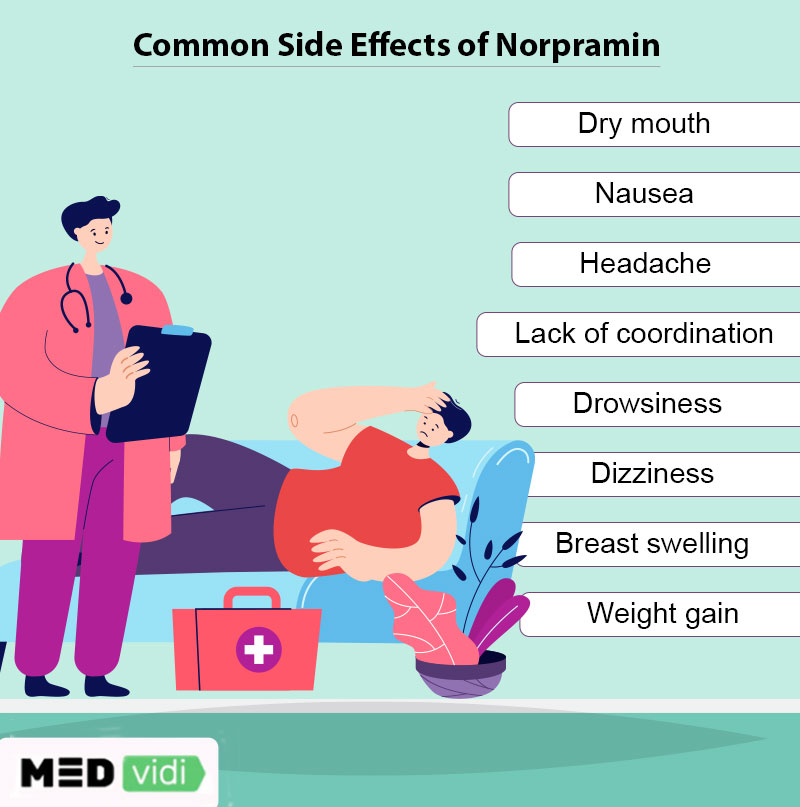Norpramin® (generic name: desipramine drug) is a tricyclic antidepressant medication. It works by restoring the balance of natural chemicals in the brain.
Antidepressants are used to treat a wide range of diseases, including depression and other mental health disorders. Norpramin has been used to treat bulimia and ADHD problems and to aid in the detox from cocaine. The current article, on the other hand, will concentrate on the efficacy of this medication in treating depression in adults.
Depression is curable. Seek expert guidance on treatment options.
How Does Norpramin Work?
Norpramin affects the recycling of two essential neurotransmitters:
- Serotonin, an inhibitory neurotransmitter, maintains the brain’s balance of inhibition and excitement. It is required to sustain one’s mood, sleep cycle, digestion, and immune system.
- Norepinephrine is an excitatory (stimulating the brain) neurotransmitter that regulates mood, sleep, and digestion.
This medicine improves depression symptoms by preventing the reuptake of the above-mentioned chemicals. Norpramin also inhibits histamine-1 and alpha-1 adrenergic and muscarinic receptors, causing a sedative and hypnotic effect in some people.
How Is Norpramin Used?
Desipramine is available as an oral tablet. It is often taken one or more times daily, with or without food. Every day, take desipramine around the same time. Ask your doctor or pharmacist to explain any directions on your prescription label that you don’t understand, and then follow them exactly. Desipramine must be consumed exactly as directed.
Note: Follow your doctor’s instructions regarding how often to take this medication.
It may take from three to six weeks for you to fully benefit from desipramine. Even if you feel better, do not discontinue desipramine without first consulting your doctor. If you discontinue the medication abruptly, you may experience withdrawal symptoms such as nausea, headache, and weakness. Your doctor will most likely recommend reducing your dose progressively.
Norpramin Dosage
When prescribed for depression, the dosage of Norpramin per day is usually 100 mg to 200 mg, depending on the patient’s condition or the severity of the problem. The daily dose can be increased to 300 mg. Doses over 300 mg are not advised, while certain hospitalized patients may receive a larger dose. Individuals 65 and older often start on a modest dose of 25 mg to 50 mg.
Consult a medical specialist at MEDvidi to get depression medication online.
Norpramin Side Effects
Norpramin also has side effects in addition to the intended effects. Elderly adults and those who are ill or debilitated are more likely to experience serious side effects. Even though not all of them are likely to occur, if they do, medical treatment may be required.
There are various side effects of Norpramin that you should be aware of. These are some examples:
| Common Side Effects | Serious Side Effects |
|
|
Remember that your doctor recommended this medication because they believe it will benefit you more than harm you. Many users of this medicine report no significant negative effects.
If you are experiencing negative side effects from your depression medication, speak with a medical professional.

Precautions
To be safer and reduce the risk of having side effects from Norpramin; you should follow these precautions:
- Inform your doctor if you are using a monoamine oxidase (MAO) inhibitor, such as isocarboxazid (Marplan) or linezolid (Zyvox), or if you have just discontinued taking an MAO inhibitor. Your doctor will most likely advise you not to take desipramine.
- Tell your doctor and pharmacist about all prescription and over-the-counter drugs, vitamins, herbal products, and dietary supplements you are now using or plan to take so as to avoid any medicine or food interactions.
- If you are pregnant, breastfeeding, or planning to become pregnant, let your doctor know about that to choose the most suitable treatment for depression.
- You should be aware that Norpramin may cause drowsiness. Do not drive or operate machinery until you have determined how this drug affects you.
- Take the missed dose as soon as you remember it. If it is almost time for your next dose, skip the missed dose and return to your regular dosing plan. Never take two doses at once to make up for missed one.
Drug Interactions
A medicine may interact with other medications, resulting in serious outcomes. Be sure to discuss your complete medical history with your doctor and the names of medications you are already taking. Norpramin may have an interaction with the following agents:
- Monoamine oxidase inhibitors (MAOIs)
- Medications for blood pressure
- Barbiturates
- Levodopa
- Anticholinergic agents
- Citalopram
- Medications for diabetes
- Methylphenidate
End Note
Norpramin is prescribed for several psychological disorders, many of which respond well to psychotherapy. If you are given this medication to treat depression, think about finding a licensed therapist or counselor who can help you comprehend what you are going through, find a suitable treatment, and help establish a self-care routine. With proper support from a psychotherapist, you can create plans for a better, more long-lasting mental health outcome than you might get from medication alone.












